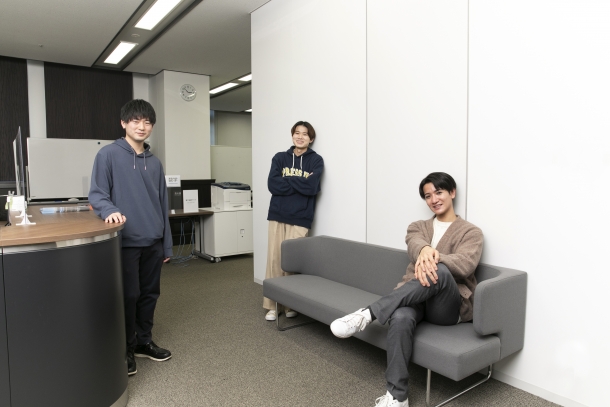LAによるデータサイエンス 学習サポート
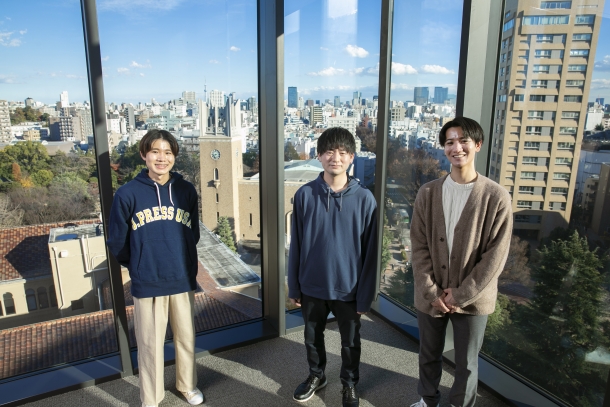
Math & Stat Centerを最大限使いこなしてほしい
Math & Stat Centerでは、「LA(ラーニング・アシスタント)」による学生へのデータ科学に関する学習支援を行っています。LAを担当するのは、データ科学教育プログラムの科目を履修した経験のある現役の学生です。そのため、等身大の学生ならではの気軽な相談・質問が可能になっています。
本記事では、LAの活用方法、データ科学の学びのポイントや魅力について、現役のLA3名に語り合ってもらいました。
座談会参加学生
・堀之内康平さん(大学院基幹理工学研究科修士1年)
・阿部太一さん(社会科学部4年)
・森田一輝さん(法学部4年)
常駐するLAに、いつでも気軽に質問することが可能
――LAの仕事について教えてください。
堀之内「早稲田大学ではさまざまな施設にLAが配置されており、学生は質問や相談をすることができます。データ科学分野については、早稲田キャンパス3号館2階の『Math and Stat Center』にLAが常駐していて、授業期間中の月~土曜日、9:30~18:00に利用することが可能です」
阿部「予約をすれば、オンラインでの面談も可能なので、所沢など遠方のキャンパスの方におすすめです。簡単な質問はチャットでも受け付けています」
森田「混雑状況にもよりますが、一人に対し、複数名のLAがサポートを行うことも多いです。Math and Stat Centerには数学や情報の担当LAもいるので、質問によって私たちが別担当のLAを案内することもあります」

Math and Stat Centerにおける、LAによる学習サポート風景
“何をすべきか分からない”状態でも、LAに相談してほしい
――利用者は、どのような質問・相談をすることができるのでしょうか?
堀之内「基本的には自由ですね。大半の利用者は、グローバルエデュケーションセンター設置のデータ科学科目について、授業中に分からなかった点を質問します。文系の学生ですと、4年生になり卒業論文を書くにあたり、『この参照論文の統計資料の意味が分からない』『アンケートをどのように解釈すれば良いかを教えてほしい』といったこともよく聞かれます」
阿部「データ科学科目以外でも、学部の主専攻で統計やデータを活用したいという方には、できる限り対応するようにしています」
森田「データ分析環境に関する質問も多いですね。授業では『Jupyter Notebook』というソフトウェアを開発できるツールを使用するのですが、そのインストール方法などを聞かれることも、学期の初めにはあります」
阿部「データ科学教育プログラムでは一定の単位を修得すると、『データ科学認定制度』の認定を取得して能力を証明できるのですが、そのプログラムの内容や効果的な取得方法について相談を受けることもありました。将来のキャリアビジョンと照らし合わせた履修方法も、相談が寄せられます」
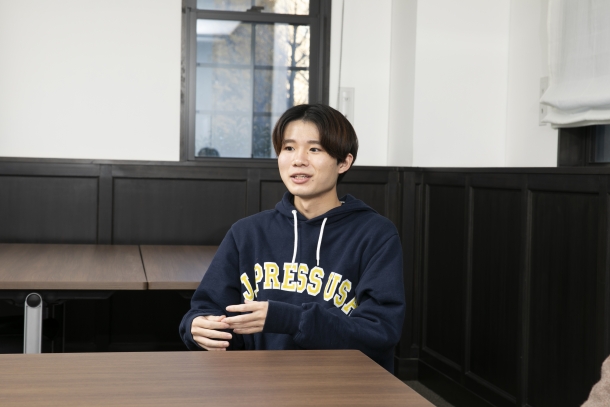
サークルは早稲田大学マーケティング研究会に所属し、ビジネスコンテストで定量的な検証プロセスの重要性に気付いたという阿部さん
森田「そもそもデータ科学に関する知識がゼロで、何から手をつければいいかが分からない……という方もぜひLAに相談してほしいですね。私たちはプログラムの全体像を把握しているので、『文系で数学も苦手な場合は統計リテラシーから』『理工学部で単位の互換制度があるので、グローバルエデュケーションセンターのこの科目は履修不要』といった案内ができます」
堀之内「グローバルエデュケーションセンター設置のデータ科学科目は、基本的にオンデマンド授業なので、対面で相談することは有意義だと思います。もちろん私たちは学生なので、高度な知識を要する質問は、担当教員などと連携します。LAは“学びの内容”ではなく“学ぶ方法”をアドバイスすることが多いです。ただしいずれにせよ、ちょっとした質問があればなんでも聞いてもらえればと思います」
“人間”ベースのカリキュラムで、直感的に学習できた
――皆さんはどのように、データ科学を学んだのでしょうか?
阿部「社会科学部で統計を扱うゼミに所属しているため、ゼミの先生の勧めでグローバルエデュケーションセンター設置のデータ科学科目を履修するようになりました。私は統計の基礎知識があったため、春・夏学期で 6〜7 科目を一気に履修したのですが、結構大変でした(笑)ただ、その分早く制度認定してもらえるので、統計や数学の前提知識がある人はせひチャレンジしてみてください。将来はデータサイエンティストを志望していて、技術職というよりは、ビジネスの視点からデータ科学を使いこなし、課題を解決していきたいと考えています」
堀之内「基幹理工学研究科という大学院の数学応用数理専攻で、数理モデルを研究しています。私の場合、実用的なデータの解析手法というよりは、データそのものの特性に対し、どのようなモデルでアプローチするかを考える領域です。統計学に関心があったので、学部3年のときにデータ科学科目を履修し始めました」
森田「法学部で行政法を研究するゼミに所属していて、司法試験に向けて勉強しています。直接的にデータ科学を使用する専攻ではないのですが、長いキャリアを考える際、“データ科学×弁護士”という個性が一つの希少価値になると考えました。実際に法科大学院の入試面接ではアピールポイントになっています」
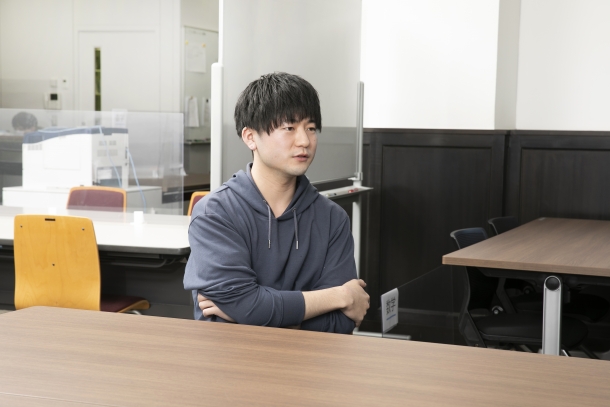
グローバルエデュケーションセンターに設置される全学オープン科目で数学を学び、データ科学にも関心を抱いたという森田さん
――主専攻とデータ科学を両立して学ぶポイントを教えてください。
森田「副専攻科目は他にもさまざまなものがありますが、データ科学の科目群はフルオンデマンドであることが特徴です。そのため、主専攻の時間割とバッティングすることがなく、空き時間を活用して効率的に学ぶことができます」
阿部「文系の学部に進んでも、ゼミや卒業論文でデータを扱うシーンは多いので、数学や統計が苦手な人は1・2年生のうちにグローバルエデュケーションセンター設置の統計・データ科学科目を履修すると良いと思います。その後で学ぶことの理解度も深まるのではないでしょうか」
堀之内「早稲田のデータ科学教育プログラムは、“人間の意思決定のプロセスを定量化する”という枠組みで、全ての科目が統一されていることが魅力です。他大学にある一般的なデータサイエンスの学部と異なり、各問題を広い視点から学ぶことができました。理系のさまざまな領域でもデータの重要性は増していくので、身につけた視野そのものが役に立つと思います」
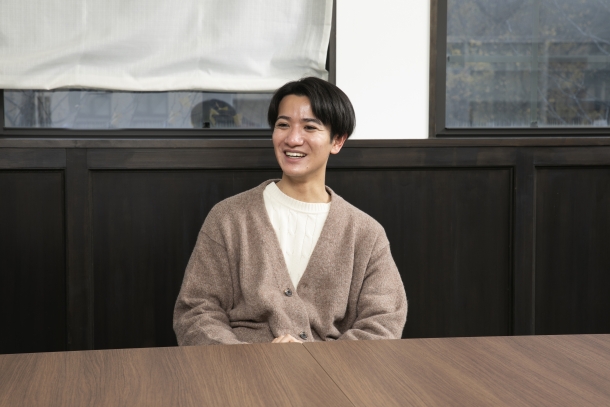
もともと数学が得意ではなかった堀之内さんは、大学入学後に微積分や線形代数を学び直したため、統計学を学ぶのは一部の文系学生よりも遅れていたという
学びたい領域を明確にし、その手段としてデータ科学を身に付ける
――これからデータ科学教育プログラムの履修を考えている人に、メッセージをお願いします。
森田「統計やデータに関するワードについて、私は高校生の頃は何も理解していませんでした。むしろ字面に怯えていた印象だったのですが、実際に早稲田のデータ科学教育プログラムで学んでみると、人間の意思決定の考え方という広い視点でデータサイエンスを体系化されているので、学びやすく文系でも安心です。LAもサポートするので、知識ゼロの状態からチャレンジしてみてください」
阿部「たしかにそうですね。私も高校の頃は、統計というと公式を暗記するイメージでした。でも実際は、社会で消費行動を分析したり、施策が正しかったかを検討したりするのに役立つ、実践的な学問であることが分かります。「数学が苦手だからデータサイエンスは難しそう。。。」という人も、まずは自分の学びたい領域をしっかりと考え、その上でツールとして統計やデータ分析を学ぶのが良いのではないでしょうか」
堀之内「世の中における『データサイエンス』という言葉の重要性が増していく中で、『知らなければ大変なことになる』と不安に思われる方も多いでしょう。そんな不安が、実際に学んでみると払拭されます。決して斬新でマニアックなことをしているわけではなく、一歩ずつ学ぶことで誰もが分かる学問です。基本がわかれば、ニュースの内容や他の授業に対し、理解度がぐんと上がると思います。専門性を身に付けたいという方だけでなく、リテラシーを高めるという目的で履修したい方にも、「WASEDAのデータサイエンス」教育はマッチするのではないでしょうか」
